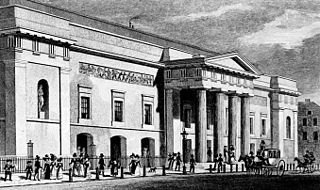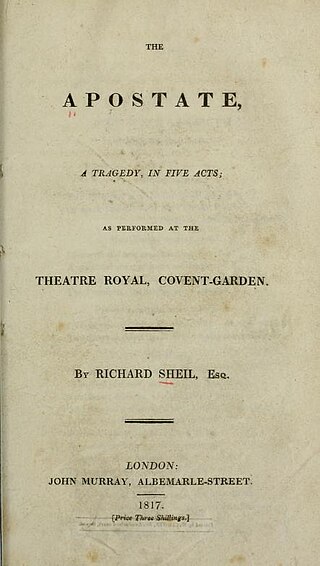This article relies largely or entirely on a single source .(February 2011) |
Daniel Egerton (1772–1835) was an English actor.
This article relies largely or entirely on a single source .(February 2011) |
Daniel Egerton (1772–1835) was an English actor.
Egerton was born in the city of London on 14 April 1772. According to various accounts, presumably supplied by himself, he was 'bred to the law in a public office.' Another source says, however, 'he was in business near Whitechapel, and made his first attempt on the stage in this assumed name at the Royalty Theatre.' [1] He played also once or twice for benefits at the Haymarket Theatre. On 4 June 1799 he made, as Captain Absolute in The Rivals , his first appearance at the Birmingham theatre, then under the management of the elder Macready. Here he remained two summers, playing during the winter months with Stephen Kemble in Edinburgh. On 28 November 1801, as Millamour in Arthur Murphy's Know Your Own Mind , he made his first appearance at Newcastle. He was first seen in Bath on 17 May 1803, as Frederick in George Colman the Younger's The Poor Gentleman . At Bath he also played Jaffeir in Venice Preserved and other characters. After the departure of Robert William Elliston from Bath, Egerton played Lord Townly in Colley Cibber's The Provoked Husband , Mr. Oakley in The Jealous Wife , Rolla in Pizarro , and many important parts.
Egerton left Bath for London in 1809, appearing on 28 Oct at Covent Garden during the O. P. Riots as Lord Avondale in Thomas Morton's The School of Reform . In tragedy King Henry VIII, Tullus Aufidius in Coriolanus , Syphax in Cato , and Clytus in Alexander the Great were esteemed his best parts. From this time until close upon his death he remained a member of the Covent Garden company, his chief occupation being secondary characters in tragedy or serious drama and what is technically called 'heavy business.'
While engaged at Covent Garden he assumed the management first of Sadler's Wells (1821–1824), and of the Olympic Theatre (1821). He acted himself at neither house, though his wife, Sarah Egerton, constituted at both a principal attraction. His conduct of the Olympic embroiled him for a time with the management of Covent Garden. It was, however, a failure and was soon abandoned. On 1 July 1833, in conjunction with William Abbot, his associate at Covent Garden, he opened the Victoria Theatre, previously known as the Coburg. In 1834 he retired from the management ruined, and died in July 1835. [2]
Egerton was five feet ten inches in height, of strong and rather portly appearance. Contemporary criticism charges him with listlessness in his acting. The Thespian Dictionary says he gave in Birmingham in 1800 an entertainment of his own extracted from George Alexander Stevens's Lecture on Heads, &c., and entitled 'Whimsicalities.' A portrait of him as Clytus in Alexander the Great is in the Theatrical Inquisitor, vol. xi.

William Abbot or Abbott was an English actor, and a theatrical manager, both in England and the United States.

William Charles Macready was an English stage actor.

Charles Kemble was a Welsh-born English actor of a prominent theatre family.

Charles Mayne Young was an English actor. He was born to a respected London surgeon (doctor). His first stage appearance was in Liverpool on 20 September 1798, where he played a Young Norval in Home's blank verse tragedy Douglas. Young's first London appearance was in 1807, as Hamlet with his friend Charles Mathews playing Polonius. "With the decline of John Philip Kemble, and until the coming of Kean and Macready, he was the leading English tragedian". He retired in 1832 in a farewell performance playing Hamlet with, as a special honour to him, Mathews as Polonius and Macready as the Ghost.

Sarah Egerton (1782–1847) was an English actress. The judgement of William Macready was that "her merits were confined to melodrama."

Daniel Terry (1780?–1829) was an English actor and playwright, known also as a close associate of Sir Walter Scott.

Henry Erskine Johnston (1777–1838?) was a Scottish actor given the sobriquet The Edinburgh Roscius. .

Charles Murray (1754–1821) was a Scottish actor and dramatist.

James Prescott Warde (1792–1840) was an English actor. He came up as a provincial tragic actor, in the Garrick mould. The Dictionary of National Biography says he was "full of promise at the time of his first appearance in London", in 1818, but did not reach the top ranks of the profession.
Laurence Clinch (c1740-1812) was an Irish actor, familiarly known as Larry, and accomplished in both tragedy and comedy. The popular farce St Patrick's Day was written and performed to showcase his particular talent.
Retribution is an 1818 British tragedy by the writer John Dillon. It premiered at the Theatre Royal, Covent Garden in London on 1 January 1818. The original London cast included Charles Mayne Young as Veranes, King of Persia, William Macready as Chosroo, Charles Kemble as Hamed, Daniel Egerton as Abdas, William Abbot as Hafiz, Daniel Terry as Suthes, Charles Connor as Sohrab and Elizabeth O'Neill as Zimra.

Fazio is a tragedy by the British writer Henry Hart Milman. It was first published in 1815. An unauthorised adaptation was performed at the Surrey Theatre under the title The Italian Wife. Another unauthorised version was performed at the Theatre Royal, Bath. In 1818 Milman granted permission for the Theatre Royal, Covent Garden to stage the play. It premiered there on 5 February 1818. It starred Charles Kemble as Giraldi Fazio, Elizabeth O'Neill as Bianca, Daniel Egerton as the Duke of Florence, Charles Mathews as Gonsalvo, William Blanchard as Bartolo, Harriet Faucit as Aldabella and Charles Connor as Falsetto. A first Dublin performance took place at the Crow Street Theatre on 6 April 1818. Fanny Kemble later played Bianca in Britain and America, where she appeared at the Park Theatre in 1832. It was revived on both sides of the Atlantic over the following decades.

Foscari is an 1826 historical tragedy by the British writer Mary Russell Mitford. The plot revolves around Francesco Foscari, the son of the Doge of Venice, who is wrongly accused of murder and has to go into exile. It premiered at the Theatre Royal, Covent Garden on 4 November 1826. The original cast included Charles Mayne Young as Foscari, Doge of Venice, Charles Kemble as Francesco Foscari, James Prescott Warde as Count Erizzo, and Daniel Egerton as Donato.

Charles the First is a historical tragedy by the British writer Mary Russell Mitford. It depicts the imprisonment and trial of Charles I before his execution in 1649 following his defeat in the English Civil Wars. It was first written in 1825 and originally intended to be performed at Covent Garden. Mitford wrote the play with the encouragement of William Macready and Charles Kemble, the two leading performers at Covent Garden. However, the politically controversial top of regicide led to it being refused a licence by the Lord Chamberlain, the Duke of Montrose.

Charles Connor was an Irish stage actor of the early nineteenth century. Educated at Trinity College Dublin, he was active in Dublin at the Crow Street Theatre during the early stages of his career. He also featured at the Theatre Royal, Bath. He appeared as part of the Theatre Royal, Covent Garden company from 1816 to 1826, where he was considered the resident stage Irishman. His death from apoplexy in St James's Park on 7 October 1826 opened the way for a fresh actor Tyrone Power to take over his parts. The Gentleman's Magazine particularly remembered him for his performances as Sir Lucius O'Trigger in Richard Brinsley Sheridan's The Rivals.

Thomas Comer (1790–1862) was a British stage actor. Comer was born in Bath in Somerset. After appearing in the West End at the Drury Lane and Covent Garden theatres, he emigrated to the United States and established himself as a leading music director, working at the Boston Theatre for many years.

Damon and Pythias is an 1821 tragedy by the Irish writers John Banim and Richard Lalor Sheil. It is based on the Greek legend of Damon and Pythias. It premiered at the Theatre Royal, Covent Garden in London on 28 May 1821. The original cast included William Macready as Damon, Charles Kemble as Pythias, William Abbot as Dionysius, Daniel Egerton as Damocles, William Chapman as Nicias, Thomas Comer as Procles, Charles Connor as Lucullus and Maria Foote as Hermion. It was widely performed in Ireland and the United States including at the Chestnut Street Theatre in Philadelphia.

The Apostate is an 1817 tragedy by the Irish writer Richard Lalor Sheil. It premiered at the Theatre Royal, Covent Garden on 3 May 1817. The original cast included William Macready as Pescara, Charles Kemble as Hemeya, Charles Mayne Young as Malec, Thomas Comer as Hamy, Charles Murray as Alvarez, Daniel Egerton as Gomez and Elizabeth O'Neill as Florinda. The prologue was spoken by Charles Connor. It was loosely inspired by a 17th century work by the Spanish playwright Pedro Calderón de la Barca. The play was a success, but reviewers generally attributed this to O'Neill's acting rather than Sheil's writing.
Adelaide is an 1814 tragedy by the Irish writer Richard Lalor Sheil. It premiered at the Crow Street Theatre in Dublin on 19 February 1814. The Dublin cast included Elizabeth O'Neill in the title role and Charles Connor as Count Luneburg. On 23 May 1816 it appeared for the first time in London's West End at the Theatre Royal, Covent Garden. The first London cast featured Elizabeth O'Neill reprising her Dublin role as Adelaide, Charles Mayne Young as Count St. Evermont, Charles Kemble as Count Lunenburg, William Abbot as Albert, Charles Murray as Godfrey, Daniel Egerton as Colbert, Sarah Egerton as Madame St. Evermont and Maria Foote as Julia. It takes place in Germany amidst emigres who have fled from the French Revolution.

William Chapman was a British stage actor active in the late eighteenth century and early nineteenth century. Considerable uncertainly exists about his early biography, but he became an established performer in London's West End at the major theatres Covent Garden, Drury Lane and Haymarket. Considerable crossover may exist with other actors of the era named Chapman.,
![]() This article incorporates text from a publication now in the public domain : Stephen, Leslie, ed. (1889). "Egerton, Daniel". Dictionary of National Biography . Vol. 17. London: Smith, Elder & Co.
This article incorporates text from a publication now in the public domain : Stephen, Leslie, ed. (1889). "Egerton, Daniel". Dictionary of National Biography . Vol. 17. London: Smith, Elder & Co.